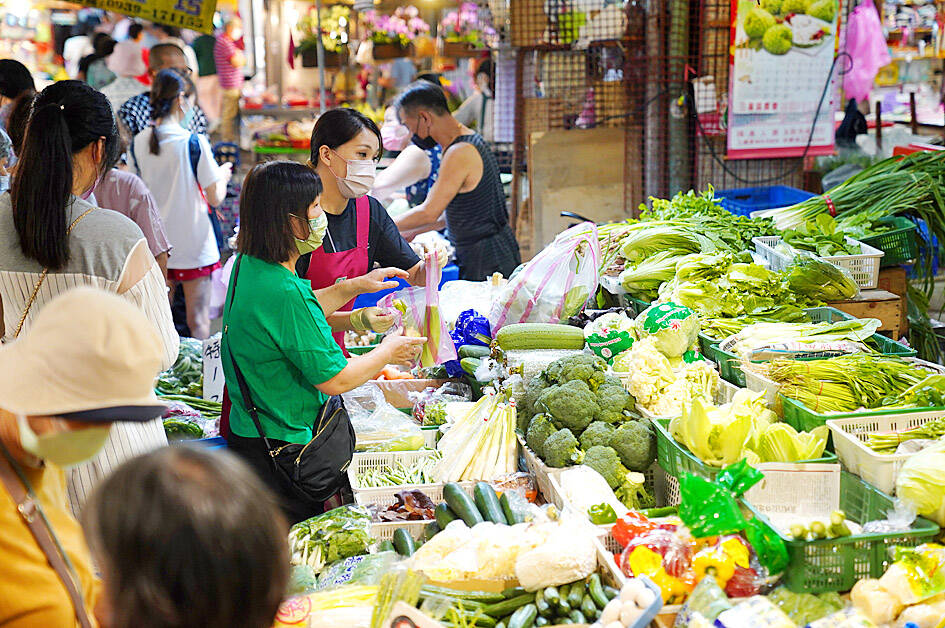The nonprofit Consumer’s Foundation on Wednesday said its latest pesticide residue testing conducted on 12 randomly chosen samples of fresh vegetables resulted in a failure rate of 33.33 percent, while two of the samples labeled or advertised as “organic” were found to contain large amounts of pesticide residue.
The foundation said it purchased vegetables in August last year at wet markets and traditional night markets in Taipei, New Taipei City and Taichung.
The items were tested for agricultural pesticide residue using a rapid pesticide screening method recommended by the Ministry of Health and Welfare, it said.

Photo: CNA
Of the 12 items, three were labeled as organic products, including one cucumber, one ceylon spinach and one Chinese spinach, it said.
Two of the three failed pesticide residue testing, the foundation said.
The results showed that of the 12 samples tested, four failed pesticide residue testing, including the ceylon spinach labeled as organic, which failed testing for nine different types of pesticides and was found to have seven types of pesticide residue, which when combined exceeded the maximum residue limits (MRL) for non-organic produce by a factor of 2,017, it said.
Meanwhile, the Chinese spinach purchased at a stall with an advertisement board bearing the word “organic” was found to have three types of pesticide residues, it said.
Among the other two failed items, an ordinary ceylon spinach was found to contain pesticide residue 100 percent higher than the MRL, while a similar level was also found in a Chinese leek, the foundation said.
The foundation said that suppliers of farm produce incorrectly labeled as organic can face fines ranging from NT$30,000 to NT$300,000 in accordance with the Organic Agriculture Promotion Act (有機農業促進法) and related regulations.
The foundation urged consumers to check whether vendors selling organic vegetables have a certificate indicating they have been certified to sell such produce, and that the certificate contains the name of the certifying body and a registration number.

Taiwan is to have nine extended holidays next year, led by a nine-day Lunar New Year break, the Cabinet announced yesterday. The nine-day Lunar New Year holiday next year matches the length of this year’s holiday, which featured six extended holidays. The increase in extended holidays is due to the Act on the Implementation of Commemorative and Festival Holidays (紀念日及節日實施條例), which was passed early last month with support from the opposition Chinese Nationalist Party (KMT) and Taiwan People’s Party. Under the new act, the day before Lunar New Year’s Eve is also a national holiday, and Labor Day would no longer be limited

COMMITMENTS: The company had a relatively low renewable ratio at 56 percent and did not have any goal to achieve 100 percent renewable energy, the report said Pegatron Corp ranked the lowest among five major final assembly suppliers in progressing toward Apple Inc’s commitment to be 100 percent carbon neutral by 2030, a Greenpeace East Asia report said yesterday. While Apple has set the goal of using 100 percent renewable energy across its entire business, supply chain and product lifecycle by 2030, carbon emissions from electronics manufacturing are rising globally due to increased energy consumption, it said. Given that carbon emissions from its supply chain accounted for more than half of its total emissions last year, Greenpeace East Asia evaluated the green transition performance of Apple’s five largest final

Taiwan is to extend its visa-waiver program for Philippine passport holders for another year, starting on Aug. 1, Minister of Foreign Affairs Lin Chia-lung (林佳龍) said on Friday. Lin made the announcement during a reception in Taipei marking the 127th anniversary of Philippine independence and the 50th anniversary of the establishment of the Manila Economic and Cultural Office (MECO) in Taiwan, the Ministry of Foreign Affairs said. The decision reflected Taiwan’s commitment to deepening exchanges with the Philippines, the statement cited Lin as saying, adding that it was a key partner under the New Southbound Policy launched in 2016. Lin also expressed hope

Temperatures in New Taipei City’s Sindian District (新店) climbed past 37°C yesterday, as the Central Weather Administration (CWA) issued heat alerts for 16 municipalities, warning the public of intense heat expected across Taiwan. The hottest location in Taiwan was in Sindian, where the mercury reached 37.5°C at about 2pm, according to CWA data. Taipei’s Shilin District (士林) recorded a temperature of 37.4°C at noon, Taitung County’s Jinfeng Township (金峰) at 12:50 pm logged a temperature of 37.4°C and Miaoli County’s Toufen Township (頭份) reached 36.7°C at 11:40am, the CWA said. The weather agency yesterday issued a yellow level information notice for Taipei, New